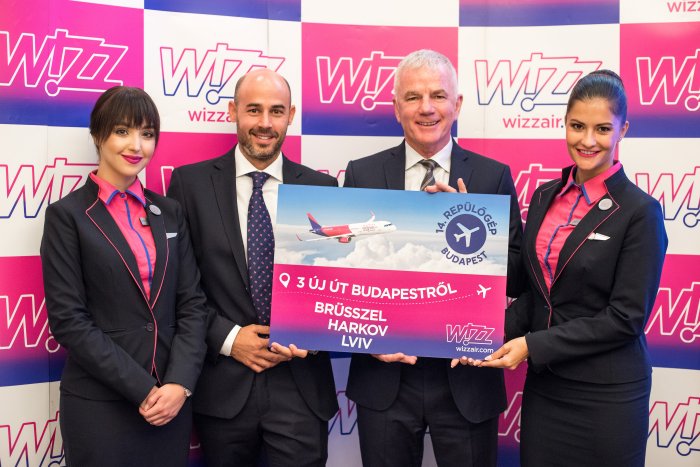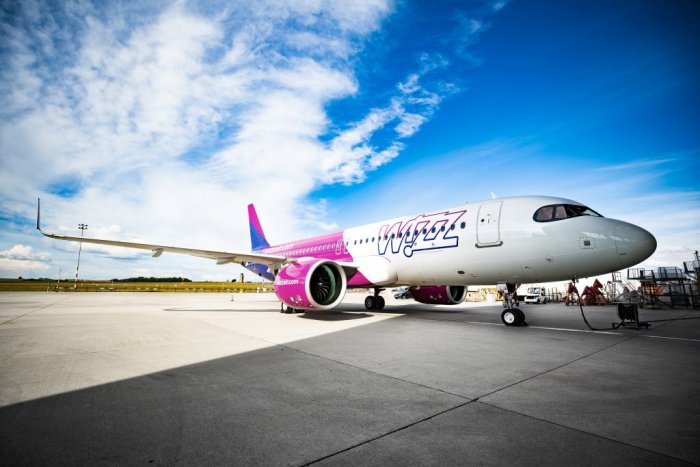Wizz Air to Nearly Triple Fleet, go Intercontinental by 2028

Wizz Air has 271 aircraft on “firm order”, meaning the budget carrier’s total fleet is set to grow to 300 by 2028 after allowing for withdrawal of older airplanes, Stephen Jones, chief executive of Wizz Air Hungary, tells the Budapest Business Journal.
Stephen Jones (second right) announcing new destinations for 2020.
Having carried some 215 million passengers since its inaugural flight in 2004, including almost 34 million last year, Wizz Air, the Budapest-headquartered budget carrier, now boasts 119 airplanes, making it “a really big size in terms of international aviation”, Jones said at a recent press conference. (Co-founder József Váradi, CEO of the parent company Wizz Air, had originally been scheduled to speak, but Jones stepped in for him.)
But with the order book totaling more than twice that number of modern, fuel-efficient Airbus-family aircraft, including 20 “extra-long range” A320xlr planes, Wizz Air is set for continued rapid expansion in the coming decade that will include flights well beyond Europe.
“Today, we are flying a number of 5-6 hour routes, while the XLR will extend our outstanding value and service proposition on routes of 7-8 hours of flying. We are continuously negotiating with many potential partners across Europe and beyond,” Wizz Air stated in answer to follow-up questions from the BBJ. That appeared to be a thinly veiled confirmation of Hungarian press reports indicating the carrier was eyeing destinations in both India and North America.
For the more immediate future, Wizz Air expects a 15% increase in traffic this year, taking passenger numbers to the 40 million level for the first time.
Profitable Growth
“We fly to 150, and soon to be announced, 151 airports around Central and Eastern Europe, with bases in 25 cities. We now employ over 4,500 people,” Jones reports. “There are very few airlines in the world that could boast this successful, profitable growth the same way that Wizz Air has done.”
But in the new era of flygskam (Swedish for “flight shame”), Wizz is more than keen to stress its environmental credentials, emphasizing that the aircraft on order are chlorophyll green.
“There is no doubt in the industry that the A321neo is the best single-aisle aircraft available today. And when we, as Wizz Air, in our business model, fill it with 239 seats, the statistics that fall out of that operation are really game changing,” he says.
In reporting “only 57.7 grams of CO2 emissions” per passenger-kilometer in August this year, the carrier lays claims to be the “greenest airline in Europe”.
“This is something we’re very proud of, and intend to maintain,” says Jones.
Wizz Claims the Patriotic Flag in Hungary
Wizz Air, founded in Hungary in 2004 according to the vision of chief executive József Váradi, proclaims itself to be the “hometown airline” of Budapest. With a 51% share of the Budapest low cost market in 2018, this is a claim few could contest, especially since the demise of state carrier Malév Hungarian Airlines in 2012.
The budget airline expects passenger traffic to climb by 337,000 this year, a 6.5% rise, to almost 5.7 million, making, with the contribution from Debrecen Airport in eastern Hungary, some six million passengers in total for the country.
“When you contrast that 5.7 million against the population of Budapest, it really speaks to the economy and economic effort that Wizz Air is bringing to this city,” says Wizz Air Hungary CEO Stephen Jones.
Further Growth
With an additional Airbus A321neo plane to be based in Budapest, bringing the total to 15 for next summer (plus two in Debrecen), and the launch of flights to Kiev, Kharkiv (in Ukraine) and Brussels airports next June, these statistics are set for further growth in 2020.
But along with the pure aviation statistics, Jones is keen to talk up the less glamorous aspects of the carrier’s activities in the Hungarian capital.
“We have our headquarters here, and employ directly more than 900 people, and indirectly around 5,000. In addition to the core airline, we have a big accounting back office, a brand new training center, we’ve got the Wizz Air Pilots’ Academy where we train pilots, and also a large IT support staff here.”
Asked by a journalist for the limits, considering the intense competition from rivals such as Ryanair, Jones retorted calmly, if determinedly: “We are competing with airlines all over Europe. In Budapest, we won’t come second to anyone. There is no second place for us. Other competitors can do what they like, but we’ll continue to grow and be the hometown airline here in Budapest.”
Wizz Prepares for Brexit Turbulence
The United Kingdom is Wizz Air’s single most important market: roughly one-third of all Wizz Air flights touch down on the island nation: the carrier flies five return flights daily just between Budapest and London Luton. This makes Brexit, the expected departure of Britain from the European Union, “a really big deal for us”, Stephen Jones, CEO for Wizz Air Hungary, tells the Budapest Business Journal.
“Brexit affects us at three levels: it’s the right to fly [to and from the United Kingdom]: it’s demand impacts that might come from Brexit: also there’s ownership and control of the airlines,” he explains.
But if, or when, the United Kingdom leaves the Union, the key factor is the ability to fly to a country no longer automatically covered by the EU’s common legal and regulatory environment.
Seeking to plug this hole in advance, Wizz Air has set up a fully owned, separate U.K. airline, licensed under that country’s Civil Aviation Authority as a stand-alone carrier, “although it’s Wizz branded, and effectively under the same marque”, says Jones.
“Legally, it’s a separate airline, and gives us the right to fly [to and from the United Kingdom]” once Brexit occurs, he says.
While admitting that, given the legislative impasse in London the rupture ultimately, remains unknown territory, Jones emphasizes that establishing the U.K. subsidiary means that, for now, “We’ve done all we can to prepare ourselves from the machinations of the U.K. parliament and [its] relationship with the EU”.
SUPPORT THE BUDAPEST BUSINESS JOURNAL
Producing journalism that is worthy of the name is a costly business. For 27 years, the publishers, editors and reporters of the Budapest Business Journal have striven to bring you business news that works, information that you can trust, that is factual, accurate and presented without fear or favor.
Newspaper organizations across the globe have struggled to find a business model that allows them to continue to excel, without compromising their ability to perform. Most recently, some have experimented with the idea of involving their most important stakeholders, their readers.
We would like to offer that same opportunity to our readers. We would like to invite you to help us deliver the quality business journalism you require. Hit our Support the BBJ button and you can choose the how much and how often you send us your contributions.








